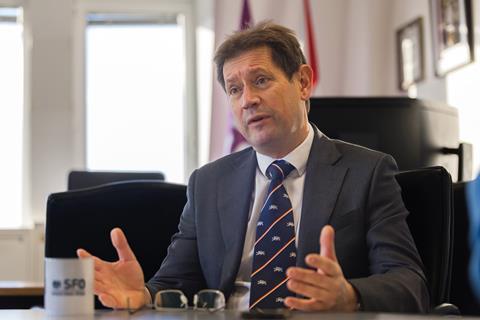The Serious Fraud Office will be testing new prevention methods to ‘cut serious fraud, bribery and corruption off at the source’ as well as explore incentivisation for whistleblowers as part of its five-year strategy.
The plan under director Nick Ephgrave also highlights the SFO’s commitment to develop its use of AI, its upcoming move to Canary Wharf as well as its aim to carry out a formal review of the strategy ‘to ensure it stays relevant and meaningful in [a] changing operating environment’ in 2026/27.
In his foreword, Ephgrave said: ‘The SFO needs to be seen as a strong, dynamic, confident and pragmatic organisation. This means playing a greater role in the national effort to tackle fraud, ensuring that SFO cases progress at a faster rate, taking bold and pragmatic decisions on our casework and, finally, being seen as the partner of choice domestically and internationally.’
The SFO plans to ‘streamline’ its casework ‘by adopting a new case management system and trial ‘new and innovative tools by setting up frameworks that let us do so in a safe and speedy manner’.
The organisation emphasised its commitment to develop the use of machine learning and AI for more mechanical and administrative tasks and to make better use of resources.

For the first time, the SFO said it will be adopting a ‘strategic’ focus on testing prevention methods to reduce serious fraud, bribery and corruption through a pilot programme.
It also wants to ‘restart’ the debate about incentives for whistleblowers, by exploring incentivisation options for whistleblowers and working with partners in the UK and abroad to find ways to encourage more corporate referrals. Little further detail was provided.
In its strategy document, the SFO said: ‘The way that we deliver our mission…needs to evolve; we must continue to build on our successes but also identify and resolve the areas in which we risk falling short of what the public needs. By 2029, this strategy will have enabled our organisation to become more effective in delivering its mission, more influential both domestically and internationally and more attractive as a place to work.’
Louise Hodges, head of criminal litigation practice at Kingsley Napley, said the document was ‘deliberately high level so signs of real change are hard to detect’ though there ‘are some important new ideas compared to the past’. She said: ‘However it remains the case that to succeed the SFO will need resources and investment to support its work and objectives.’
Corker Binning partner Nick Barnard said: ‘Much of the strategy is as you would expect. Although the SFO press office has chosen to lead with the incentivisation of whistleblowers, this should be examined in context. Only one line of the entire document pledges to ‘explore options’ for whistleblower incentivisation. We should not be surprised if this idea falls by the wayside over the next few years.’
Richard Burger, investigations partner at WilmerHale, added that the strategy suggested a ‘proactive approach’. He added: ‘The insight into where the SFO has fallen short is refreshing, but the remediation plans have to be realistic and keep pace with the rate of criminal fraud and corruption. While the new director’s recent activity has been focused on alleged frauds against the general public, the reference to the new ‘failure to prevent fraud offence’ is clearly directed at UK corporates.’









